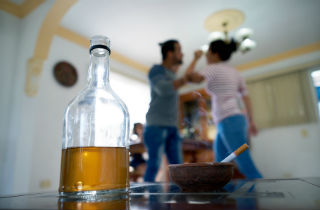Alcohol abuse in the family is a systemic problem. What can you do to help family members who abuse alcohol? And what can you do for yourself? More here, and a section at the bottom for your questions, comments and experience about family alcohol abuse.
What can you do about alcohol abuse in the family?
This is a question that faces millions of people. The word “family” implies emotions, and when emotions become involved, logic goes out the window in most cases. Someone you care about is sick and hurting. They want to stop a hangover. You want them to feel better. What is your normal response? Most people want to fix the problem.
Trying to fix alcohol problems does not work
I was blessed as a child to have people in my life who cared about me. When I was sick or hurt, there was an attitude of “kiss it better” that came into play. When possible, those around me tried to “fix” me in one form or another. These are natural tendencies. BUT THEY DO NOT WORK WITH AN ADDICTED PERSON.
Al-Anon Family Group members have taught me something I know is true. The addict you care about must be treated with “loving detachment”. You must quickly realize that you are powerless to fix the addict in your family, and to do so and get involved in their sick behaviour will make your life unmanageable. Learn what millions have before you. Love your addict but detach from their behaviour, don’t condone it, or you will become as sick as them.
So, what positive things can you do if a loved one is addicted to alcohol – How to stop?
Family alcohol abuse help
If someone you love has an infectious disease, what do you do? Most of us would insist our family member see a health care professional trained in dealing with the ailment. The same holds true for an addicted family member. Persuade them as strongly as possible to get help from someone who understands the disease and has a track record of success in helping the addicted deal successfully with their problem. An outside, objective, professional.
Some other ways that you can support your loved one include the following suggestions. Please leave us your questions and comments about alcohol abuse in the family at the end.
1. Be supportive of the good qualities your addictive family member has, but clearly point out the path they are on is destructive to them and to the family.
2. Make sure the addicted person understands what is going to happen in your “family” relationship if they continue to choose to use. Do not ever attack; remember your addict is a sick person.
3. In a loving manner, insist your addict get help. Suggest that they try no alcohol for a month. If “nice” doesn’t work and the problem continues, consider an intervention. A professional who knows how to intervene is a good investment.
4. Don’t lie for the addict or make excuses to others for their behaviour.
5. Don’t source their drug of choice for them. Enabling addiction and not holding the addict responsible for their behaviour is counter productive.
To get help for alcohol abuse in the family, the first thing to remember is: Don’t try to “fix”. Don’t get taken into their addiction; make your family member responsible to get professional help and support them in their actions to overcome addiction.
You are dealing with a sick person whose illness will adversely affect all around them. Treat the situation the same as you would any other serious illness. Once again, the simple answer for those dealing with an addicted family member; don’t try to “fix”.
Family alcohol abuse problems
Does your family have a problem with alcohol abuse? Please leave us your questions or comments below. We will be happy to try to respond to you with a personal and prompt reply as soon as we can. You are not alone!









Related Posts